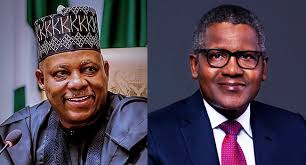Why Nigeria’s VP Warns: Treating Aliko Dangote Wrong Could Ruin Africa’s Image – $20B Refinery at Stake in Union Clash
In the heart of Nigeria’s bustling economic corridors, a single man’s legacy hangs in the balance. Vice President Kashim Shettima just dropped a bombshell: “Aliko Dangote is an institution. How we treat him will determine how outsiders will judge us.”
Aliko Dangote, the African billionaire behind the Dangote refinery powerhouse, finds himself at the center of a fiery PENGASSAN dispute that’s shaking up the Nigeria economy. As the world’s richest Black billionaire with a net worth soaring past $23 billion in 2025, Dangote’s oil refinery battles labor unions over staffing, spotlighting tensions in Africa’s energy sector. This clash isn’t just local drama—it’s a litmus test for investor confidence worldwide.
Dangote, Africa’s undisputed business titan, built his empire from humble Kano roots. Starting with a small trading firm in the 1970s, he transformed Dangote Group into a conglomerate spanning cement, sugar, and now, the continent’s largest oil refinery. That $20 billion Lagos behemoth, operational since early 2024, aims to end Nigeria’s crippling fuel import dependency, churning out 650,000 barrels daily. But recent sackings of over 100 engineers—relocated to other plants like sugar and cement operations—sparked outrage from PENGASSAN, the Petroleum and Natural Gas Senior Staff Association of Nigeria.
The union accuses the refinery of flouting local content rules by favoring expatriates, threatening strikes that could halt production. Enter Vice President Shettima, who at a recent forum slammed the union’s tactics. “Nigeria is greater than PENGASSAN,” he declared, urging national unity to shield this “systemically crucial” asset. Shettima painted Dangote not as a tycoon, but as Nigeria’s economic heartbeat—if he poured his billions into Silicon Valley instead, he’d be worth $70-80 billion today, yet he bet on home soil.
Public reactions pour in hot and heavy on social media. Bashir Ahmad, a prominent Nigerian voice, echoed Shettima on X, calling Dangote a “leading light in Nigeria’s economic parliament.” Supporters hail him as a patriot ending Africa’s fuel shame, while critics decry job losses as corporate greed. Economic analysts, like those at Nairametrics, warn that disruptions could spike global fuel prices, rippling far beyond Lagos.
For American readers, this hits close to home in unexpected ways. The Dangote refinery guzzles U.S. crude—up to 50% of its feedstock comes from Gulf Coast exports, bolstering Texas and Louisiana producers amid Nigeria’s own supply woes. Stable operations mean steadier oil flows, potentially easing pump prices at your local Exxon. Plus, Dangote’s push into U.S.-style mega-projects signals ripe opportunities for American firms in African infrastructure—think Halliburton or ExxonMobil partnerships. Politically, it underscores U.S. interests in African energy security, countering China’s influence and stabilizing supply chains that feed everything from your daily commute to Wall Street trades.
Beyond the refinery row, Dangote’s global footprint grows. Just days ago, he broke ground on a $2.5 billion fertilizer plant in Ethiopia’s Somali region, poised to produce 3 million tons of urea annually and crown Addis Ababa as Africa’s agribusiness hub. This move, Dangote says, tackles food insecurity head-on, but it also spotlights his defiance against oil cartels that long sidelined local refining. Back in Nigeria, President Bola Tinubu and Shettima are mediating directly, stressing that national interest trumps union demands.
Experts like Bloomberg analysts see the refinery as “too big to fail,” with potential $30 billion annual revenues by 2026, even amid U.S. tariff hurdles. Labor Minister Mohammed Bagudu echoed this, calling for dialogue to protect jobs and growth. Online buzz from U.S.-based Nigerians highlights pride in Dangote’s resilience, but worry over how union militancy might scare off Yankee investors eyeing Africa’s boom.
As the PENGASSAN dispute simmers, all eyes turn to swift resolution. Shettima’s plea rings clear: mishandling Dangote risks tarnishing Nigeria’s—and by extension, Africa’s—standing on the world stage. With the refinery’s output now feeding regional markets and U.S. exports steady, a fair deal could unlock billions in trade, benefiting economies from Houston to Harlem.
In this high-stakes game, Aliko Dangote remains the African billionaire wildcard, his Dangote refinery fueling not just engines, but dreams of self-reliance. The Nigeria economy watches breathlessly, knowing one wrong move could idle the pumps and chill foreign purses. Yet, with government backing, optimism lingers for a truce that keeps the oil—and opportunities—flowing.
By Sam Michael
Follow and subscribe to us for instant push notifications on breaking Africa-U.S. business news—stay ahead of the curve!
Aliko Dangote, Dangote refinery, Nigeria economy, African billionaire, PENGASSAN dispute, oil refinery Africa, US crude exports, Shettima Dangote, Ethiopia fertilizer plant, Black billionaire net worth
